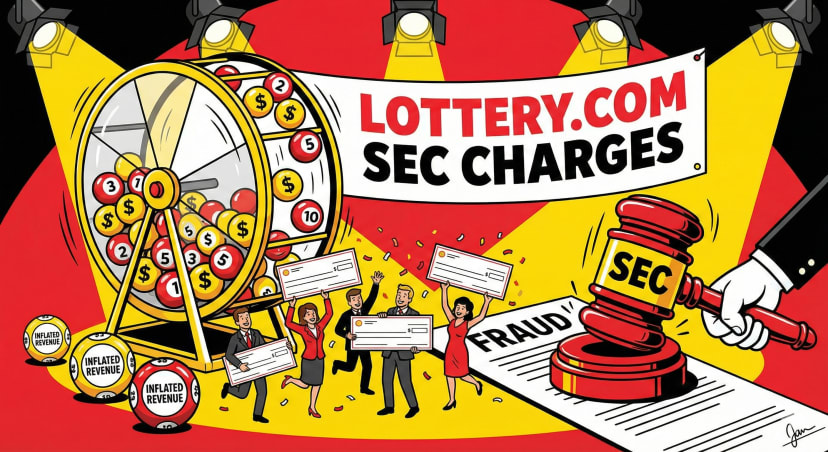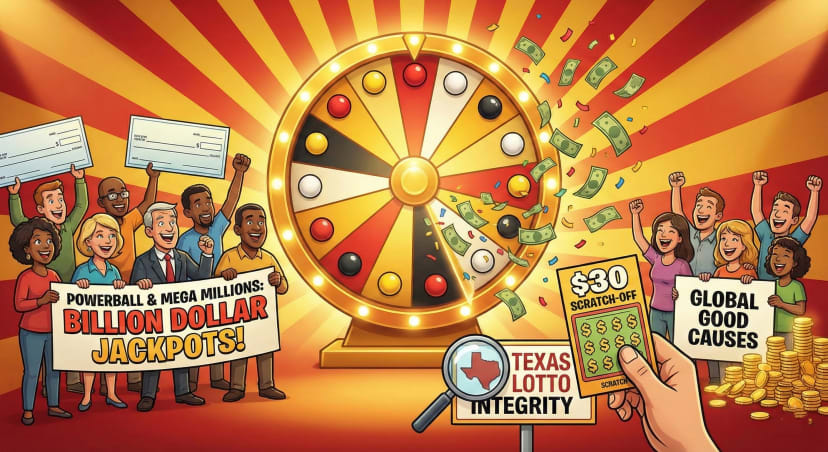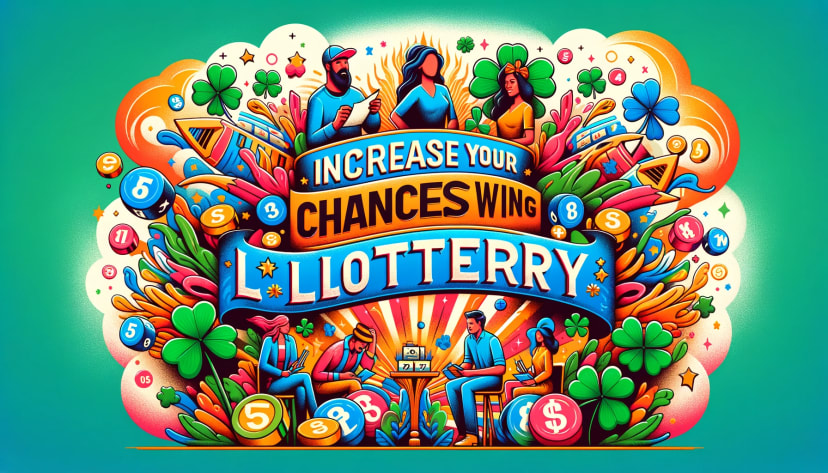Lottery Scams: What They Are and How to Avoid Them

Lottery scams are a big problem these days, tricking trusting people with promises of quick riches. These scams feed on dreams of winning big and can cause serious financial and emotional pain. In this article, we'll explain what lottery scams are, how they run their schemes, and most importantly, how you, as a Kenyan player, can avoid getting caught.
Common Types of Lottery Scams
Lottery scams come in many forms, but they all aim to trick you into thinking you've won a lottery or sweepstake. A common scam involves getting an unexpected email, phone call, or text message saying you've won a large sum of money. The scammer might pretend to be from a well-known lottery company, giving fake details about the prize. But the reality is, you haven't won anything.
Another type of lottery scam uses fake lottery tickets or scratch cards. Scammers might approach people on the street or online, selling what look like real tickets or cards. When the victims try to claim their supposed winnings, they discover the tickets are fake, and they've lost their hard-earned cash.
Signs of a Lottery Scam
Recognizing the signs of a lottery scam is key to not becoming a victim. Here are some red flags to look out for:
- Unsolicited notifications: Legitimate lotteries don't contact people who haven't entered their games. If you get a message or call saying you've won a lottery you never entered, be suspicious.
- Requests for upfront payment: Scammers often ask victims to pay fees upfront to claim their supposed winnings. Real lotteries don't ask for payment to receive prizes.
- Pressure tactics: Lottery scammers might use aggressive tactics to rush you into giving personal information or making payments. Genuine organizations give winners enough time to sort things out.
How to Avoid Falling for a Lottery Scam in Kenya
Protecting yourself from lottery scams needs care and awareness. Follow these tips to avoid becoming a victim of these fraudulent schemes:
- Research the lottery organization: If you get a notification saying you've won a lottery, take time to research the organization. Check if it's real and if it has a history of scams. A good way to verify the trustworthiness of a lottery platform is by checking LottoRanker. We list the most trusted and licensed lotto platforms available for Kenyan players.
- Never send money or provide personal information: Legitimate lotteries do not require payment to receive winnings, nor do they ask for personal information upfront. Be wary of any requests for money or personal details.
- Be cautious with online transactions: If you choose to participate in an online lottery, ensure that the website is secure and reputable. Look for secure payment options and read reviews from other users before making any transactions.
- Trust your instincts: If something feels off or too good to be true, trust your gut instinct. Scammers often use tactics to create urgency or excitement to distract victims from their better judgment.
Reporting Lottery Scams
If you encounter a lottery scam, it is essential to report it to the appropriate authorities. By reporting these scams, you can help protect others from falling victim to the same scheme. Contact your local law enforcement agency or consumer protection agency to report the scam and provide any evidence or information you have.
Additionally, you can report the scam to the Federal Trade Commission (FTC) or the Internet Crime Complaint Center (IC3). These organizations track and investigate fraudulent activities, helping to bring scammers to justice.
Real vs Fake Lotteries: How to Tell the Difference
Differentiating between real and fake lotteries can be challenging, as scammers continue to refine their tactics. However, there are some key indicators that can help you determine if a lottery is legitimate:
- Verified contact information: Legitimate lotteries provide clear and verified contact information, including a physical address and customer support details. Scammers may provide vague or incorrect contact information.
- Official website: Real lotteries have official websites that provide comprehensive information about the organization, including the rules, previous winners, and contact details. Fake lotteries often have poorly designed or non-existent websites.
- Public records: Legitimate lotteries are subject to regulatory oversight and must disclose winners' information publicly. Check if the lottery organization you are dealing with has a history of publicizing winners.
Always check whether a lottery or lottery casino is licensed and allowed to accept players from your country before joining. This is crucial for players in Bangladesh, where gambling laws are strict and many so-called Bangladesh lottery casinos operate in a risky legal grey area.
Lottery Scams and Identity Theft
In addition to financial loss, falling victim to a lottery scam can also lead to identity theft. Scammers often request personal information, such as bank account details or Social Security numbers, under the guise of processing winnings. With this information, they can commit identity fraud, opening credit accounts or making unauthorized purchases in the victim's name.
To protect yourself from identity theft, never share sensitive personal information with anyone unless you are absolutely certain of their legitimacy. Be cautious when providing personal information online and ensure that websites are secure before submitting any data.
The Role of Social Media in Lottery Scams
Social media platforms have become a breeding ground for lottery scams, with scammers leveraging the reach and anonymity of these platforms to target potential victims. They may create fake profiles or groups, claiming to represent legitimate lotteries or sweepstakes.
To avoid falling for lottery scams on social media, be skeptical of unsolicited notifications or requests. Research the organization before engaging with them, and always remember that legitimate lotteries do not ask for payment or personal information upfront.
Legal Actions Against Lottery Scammers
Law enforcement agencies worldwide are actively working to combat lottery scams, but bringing scammers to justice can be challenging due to their ability to operate across borders and hide their identities. However, there have been instances where scammers have been caught and prosecuted.
If you have fallen victim to a lottery scam or have evidence of a scam, it is important to report it to the appropriate authorities. By doing so, you contribute to the collective effort to stop these scams and protect others from becoming victims.

Lottery scams continue to be a significant threat, targeting individuals' hopes and dreams of winning big. By understanding the common types of scams, recognizing the signs, and following the tips to avoid falling victim, you can protect yourself from these fraudulent schemes.
Remember to always be cautious and skeptical when it comes to unsolicited notifications or requests for payment or personal information. Research the lottery organization, report any scams you encounter, and stay informed about the latest scamming techniques.
By staying vigilant and informed, you can avoid becoming a victim of lottery scams and help create a safer online environment for everyone.
FAQ
What is the main goal of lottery scams in Kenya?
The main goal of lottery scams is to trick people into thinking they've won a lottery or sweepstake. Scammers do this to steal money or get personal information from you.
What are some common types of lottery scams?
Common scams include getting emails or messages saying you've won a lottery you never entered. Another scam is selling fake lottery tickets or scratch cards.
How can I tell if a lottery is a scam?
Scam lotteries often send you messages out of the blue. They might ask you to pay money upfront or pressure you to act fast. These are red flags.
Why should I check out a lottery company before believing I've won?
Checking the company helps you see if it's real. You can also find out if the company has been linked to scams in the past.
Why shouldn't I give personal details if someone says I've won a lottery?
Giving personal information can put you at risk of identity theft and losing money. This is especially true if the lottery claim is fake.
How do scammers use social media to trick people with lottery scams?
Scammers create fake profiles or groups on social media that look like real lotteries. They use these fake accounts to reach many people because it's easy and anonymous.
Where can I report a lottery scam in Kenya?
You can report lottery scams to your local police station, consumer protection agencies, or report to the Communications Authority of Kenya.
What shows that a lottery is likely to be real?
A real lottery will have correct contact information, a professional website with lots of details, and will announce winners publicly.
How can new technology help stop lottery scams?
Technology like machine learning and AI can find fake activities. Blockchain can also make sure online lotteries are open and honest.
Why is it important for countries to work together to fight lottery scams?
When countries work together, police and regulators can find and punish scammers who work in different countries. This helps everyone fight lottery scams better.














